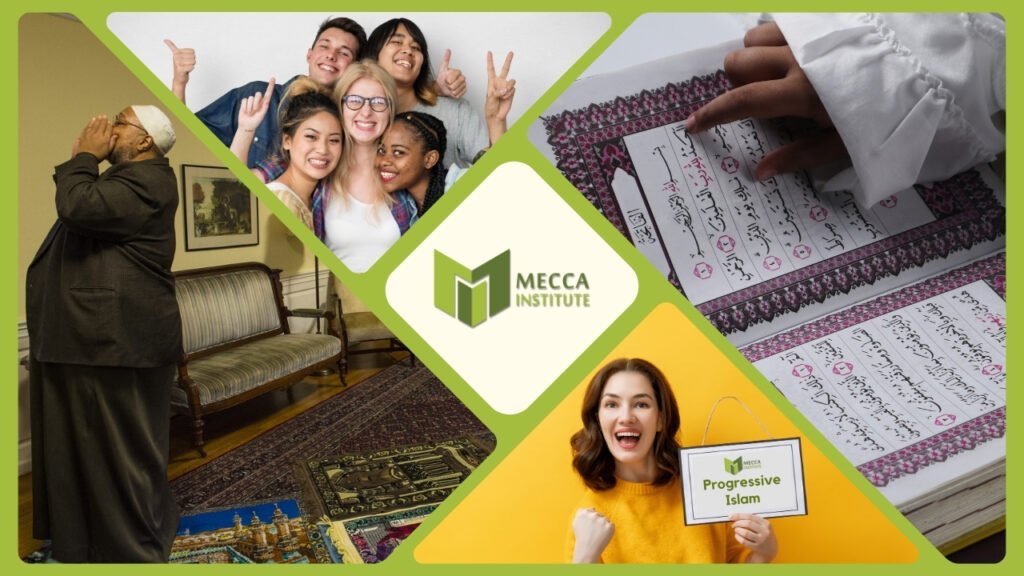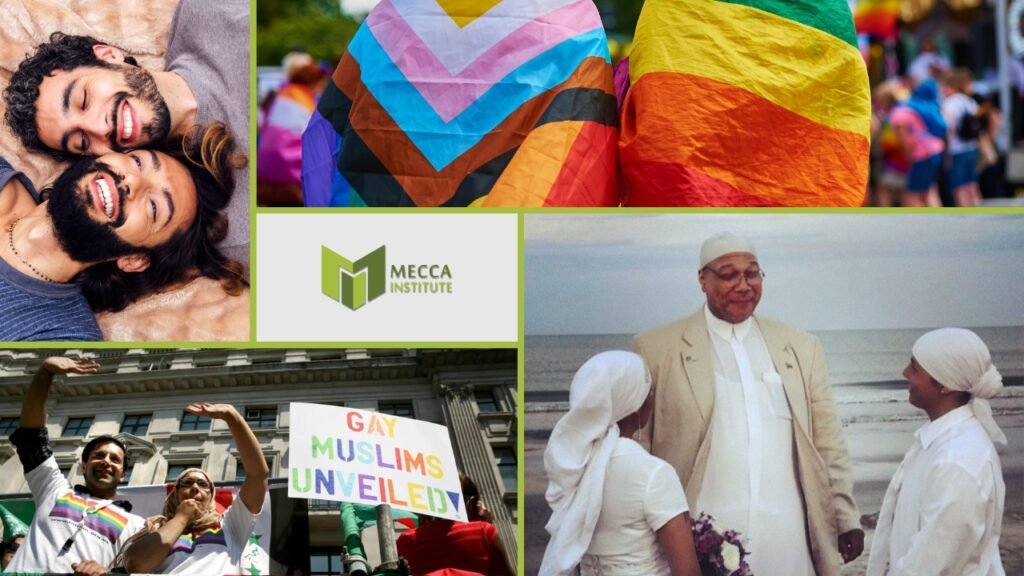Progressive Islam is more than ideals and focuses on action, says Imam Daayiee Abdullah, noting it is all about tackling modern challenges.
The world’s contemporary issues are important to Muslims. Progressive Islam, therefore, is a way to find solutions for some of these challenges.
From championing women’s rights to embracing LGBT people and everything in between, Progressive Muslims are on the frontlines of what is happening right now.
In this guide, you will learn the definition of Progressive Islam, as well as the beliefs, values, and practices that shape our communities.
Progressive Islam Definition
You might have seen Progressive Muslims in the news and wondered what Progressive Islam is. As such, this definition has a short version and a longer version. Let’s start with the short version.
What is Progressive Islam? Progressive Islam is an inclusive Islamic interpretation that envisions a community for all. Islam has been a progressive faith since the beginning. Prophet Muhammad reformed many areas of society for the better. These areas included religious freedom, racial equality, education, and women's rights.
For example, the Prophet chose a recently freed Black slave to call people to prayer. Choosing Bilal to deliver the call of prayer was a challenge to the systematic inequality of that culture prior to Islam.
Why “progressive”? Well, we should define the word first. Progressive, as a noun, according to the Oxford English Dictionary, is an “advocate of social reform.”
Therefore, Progressive Islam has a set of beliefs, values, and practices that Progressive Muslims believe are important.
Beliefs, Values, and Practices

Progressive Islam is about “progressing” or moving forward. We are not stuck in the 7th Century, but instead, we focus on the modern challenges faced by the community. As a result, we take on modern issues like social justice, equality, and environmental sustainability, to name a few.
The awareness of modern issues comes from our values. We promote Islamic values like compassion, empathy, fairness, and solidarity. Our top priorities, for example, are diversity and inclusivity. Our aim, therefore, is to create a society that celebrates differences while also making sure that no one is marginalized.
Although awareness and values are great, Progressive Islam is also about action. This means we believe in political activism, community organizing, and advocacy for policy changes that align with our values.
As you can see, this opens the door for all types of Muslims from diverse denominations to join our efforts.
That is, we are not a “sect.”
Progressive Muslims come from Sunnism, Shi’ism, Sufism, and other major branches of Islam.
Progressive Muslims
Progressive Muslims recognize a community that celebrates diversity. We understand that our Muslim communities are composed of Muslims who are spiritually Muslim, religiously Muslim, or culturally Muslim.
For example, a spiritual person who may not be religious might consider himself or herself to be Muslim. Whether or not that person has a cultural background in the Muslim World is not essential.
Likewise, a person whose cultural context is in the Muslim World may not be spiritually or religiously linked to Islam. Yet, at the same time, they may rightfully identify as Muslim.
It is true Islam is a faith and has various religious rules and regulations. Muslims, on the other hand, are individuals. They exist in large spiritual, religious, and cultural environments.
Therefore, their experiences, their histories, and their understanding of Islam are diverse. As such, progressive Muslims don’t care if someone is Sunni, Shia, or even Sufi; they care whether or not that person is progressive.
“Do you understand the issues of our time?” is the type of question that might come up.
What are some of the issues of our time?
At MECCA Institute, we focus on Women’s Rights, LGBT Rights, and Youth Rights.
Progressive Islam and Women’s Rights
Women’s rights are a historical part of Islam. Prophet Muhammad advocated for gender equality in all spheres of life in his time. Unfortunately, this is an area of our faith that even many Muslims are not aware of.
In the 7th Century, while the rest of the world kept women under a thumb, Islam was allowing women to have a voice, own businesses, determine their own lives, and even go to war.
Although Muslim women have enjoyed so much more than their counterparts, we are still dealing with some issues. Modern challenges that Progressive Islam is tackling include equal pay, reproductive rights, and access to healthcare and education.
Progressive Muslims are also working toward economic opportunities, combating gender-based violence, and initiatives to empower women politically to address systemic barriers.
Finally, Progressive Muslims are aware of intersectionalities. For instance, a Muslim woman may be straight, lesbian, bisexual, transgender, or even simply queer. As a result, caring about women’s rights is caring about LGBT rights.
Progressive Islam and LGBT Rights

For far too long, the LGBT Muslim community has experienced intolerance, ridicule, abuse, and even physical harm. As such, at MECCA Institute, we are working to make sure that Muslims understand LGBT issues.
LGBT rights are the freedoms, liberties, and opportunities LGBT people around the world should have. For instance, these rights are guaranteed in the United Nations Declaration of Human Rights.
Progressive Muslims care about LGBT rights because these rights protect LGBT people from many things. For example, inequality, abuse, and violence are based on who they love, how they are perceived, or how they self-identify.
LGBT rights offer equal protection through the separation and curtailment of religious or cultural authority to enforce ultra-legal beliefs. These beliefs disregard secular laws and governmental oversight.
LGBT rights include the full social acceptance of intimate relationships between consenting adults to marry without force or coercion.
Finally, as previously noted, Progressive Muslims understand intersectionalities. Therefore, we know that there are young people in the LGBT Muslim community, which is why we understand LGBT rights means caring about youth rights.
Progressive Islam and Youth Rights
In patriarchal cultures, the youth are silenced and are expected to sit in the back and listen to their elders.
We don’t accept that.
Youth rights are the right to life, survival, and development, including mental, emotional, cognitive, social, and cultural development. As such, we understand that the importance of progress relies heavily on valuing the voices of our youth.
The youth inherently represent such improvement for future generations. Therefore, the youth are vital because they keep us in check and make sure we are paying attention to the current issues and less to what was before.
Progressive Islam Books
Progressive Muslim books focus on contemporary challenges within Islam. These books tend to present diverse perspectives on freedom, ethics, gender justice, and human rights.
I will shamelessly start with my own book. “Progressive Islam” by Imam Daayiee Abdullah. This book celebrates liberal ideas within the faith, focusing on freedom, responsibility, and cooperation, with diverse perspectives from China, Egypt, and Saudi Arabia.
“The Imperatives of Progressive Islam” by Adis Duderija. Duderija’s book covers important topics, including the need for creativity, diverse knowledge, ethics, Islamic liberation theology, ethical jurisprudence, gender justice, non-patriarchal interpretation, and human rights.
“Progressive Muslims” edited by Omid Safi. These are essays penned by Muslim scholars, tackling post-9/11 challenges, as well as stances on contemporary issues, including renewal, gender justice, and pluralism.
“Women and Gender in Islam” by Leila Ahmed. This is a seminal study on Muslim women’s lives throughout history with profound insights into Islamic discourse, lauded for its depth and impact.
“Homosexuality in Islam” by Scott Siraj al-Haqq Kugle. This is a groundbreaking book that challenges common perceptions of Islam’s stance on homosexuality. It argues for nuanced interpretations of scripture.
MECCA Institute
MECCA Institute is America’s first Progressive Muslim organization in the education and research sector.
When I started the organization in 2014, my mission was to get as many qualified progressive chaplains to our communities as possible.
While that still remains a dream, we have since expanded our education to the digital sphere and become the largest progressive Muslim community on the planet.
Our first book, “Progressive Islam,” penned by me, has started a collection of books that are coming out over the next several years. Multiple researchers have come on board to continue our education and research agenda.
Come join our efforts by becoming a member of our community.
Conclusion
Progressive Islam uses our historical values like compassion, empathy, and fairness to tackle the world’s most pressing challenges.
We are constantly progressing as a community, always fighting for important issues such as social justice, equality, and sustainability.
With the MECCA Institute and dozens of other organizations around the world, Progressive Muslims are creating a world that fits with our ideals.
May Allah continue to guide us all.
Imam Daayiee Abdullah is the Executive Director of MECCA Institute and the author of “Progressive Islam,” a historic book that defines Progressive Islam.


Pingback: Muslim Wedding Guide to Traditions, Service, Dress, and More - MECCA Institute
Pingback: Eid Foods Guide to Help You Plan the Best Festival Treats
Pingback: Islamic Funeral Costs Guide to Help You Prepare for the Worst
Pingback: Muslim Prayer Guide for the Most Amazing Spiritual Experience - MECCA Institute